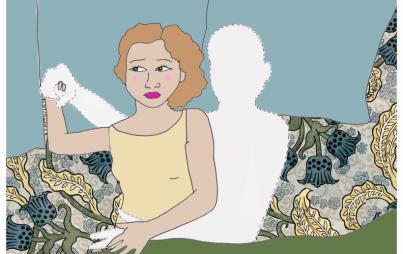
I want to write a story about the kind of magazine guy who has cotton-white teeth and knows specifics about golf courses around the country. He’s rich, but he loses his money. He’s a player, but he gets old. He has a nice car, but he drives it off a pier while drunk. Something like that.
You know the guy I’m talking about, right? He speaks gratuitously and at length about young pussy and the blessings of daddy issues. He has all of his hair and knows a bunch of facts. His name is something like Scotty Huckleberry or Francis Vanderfeller and he doesn’t look like a dork when he tucks in his shirt.
He knows all this about himself and he is awash in smuggery. It’s a bit Gatsby meets Bukowski. It’s a bit Hemingway, but the weird HBO version of Hemingway where you can’t figure out the tone. He’s not so anachronistic that he has something as saccharine as pep, but he is golden. He calls his mom by her first name.
He’s a womanizer, which is fine, but he’s just a womanizer, and he’s okay with it, which rates. He acts like this is happiness.
I’ve known a few of these guys in my lifetime, all variations on the cad theme. There was Clifford, a tennis-playing Long Island boy who also sailed and all that junk. There was Daniel, straight from L.A., who had rigid opinions about how a woman should look, as did Ian, a barrel-chested charmer who strippers genuinely liked.
In the story I want to write about Clifford Daniel Ian Montgomerydoodle, he meets a cool woman. The woman is beautiful but not in an obvious way. More important she is smarter and funnier than him, though of course he can’t see that at first. He is too blinded by misogyny. Now if I was writing a script for Hollywood he would fall in love with her and she would love him back and he would become a new, better man for her love, or she would die and he would become a new, better man for the memory of her love.
As if.
In the story I want to write, Rockland Manchester would of course fall in love with the woman but she would more or less give him some bell hooks books to read and be on her way, a little disgusted. She can see right through him, right into the desert of his soul and his desperate attempts at staving off irrelevancy, never to know true contentment. This and the alcohol bring him to an early lonely death. Loneliness is key here. It is the most important thing.
I would put this guy in a lot of scenes on his sailboat, alone, despite the conventional wisdom that scenes of a person alone are boring. On one of these trips, with the wind in his hair and in his shirt collars, Allen Cummerbund would squint at the horizon (he always looks like he’s squinting). He’s at the wheel, or whatever steers sailboats, and he takes the last sip of his bottled beer and tosses it in back of him and forgets about it. When he goes to retrieve another beer, he trips on the bottle he had just discarded and knocks out a tooth. He cries about it on the way home, where there’s no one to comfort him. He furiously flips through his black address book (an affectation) and hovers a little over the cool woman’s name, let’s just say her name is Jenny, and he calls her but she doesn’t answer. She’s acting as engaging raconteur at a dinner party attended by great literary minds, or maybe she’s slow dancing with a basketball player. Either way, she’s busy. So then he calls one of the models he knows or a cocktail waitress and she comes over and gives him a blowjob but he cries during it because his tooth hurts and he’s not able to stay hard.
Soon his love life is plagued by impotency. Yes, that’s it! He’s missing a tooth and is impotent and someone graffitis a big dick on his sailboat. It’s a coincidence but he can’t be totally sure. This makes him paranoid that all the women he has so callously used up have turned against him.
Things go downhill from there. Someone informs his mother that her son, Stanley Ashley Hamperdashy, has a blog where he documents his sex life and rates each woman using a wetness metric (sahara, deciduous, rain forest, tsunami) and posts pictures of their breasts. His mother is very disappointed in him. She can’t even look at him anymore; her heart is broken.
Not all is lost . . . yet. Men still think he is the coolest. They like to go to the bar with him and absorb his adventures and cheer his conquests. If there’s a female present then the men commiserate on how women over thirty aren’t worth fucking. They insist on manicures. But then Wellington Smoreston messes with one of his friend’s wives while his friend is battling cancer and he is ostracized from the man group and his loneliness is compounded. The men in the man group rethink their lives.
Sometimes in the story I have his mother take him out of her will. Sometimes he accidentally runs over his dog, who happens to be the only living being he truly loves, and that includes himself. Sometimes he suffers a spinal cord injury. Sometimes he goes deaf so he is unable to hear Stevie Wonder’s “He’s Misstra Know-It-All” ever again, and this is a tragedy.
When I get to those scenes, the climactic ones, the pay-off alludes me, slipping away like a frog. I grin when I first think of the scenes, scribbling away in my notebook. Sometimes I even cackle. But once I put the pen to paper and have him get his legs broken because of his gambling addiction, I feel unsatisfied. Benedict Lobstertrap deserves nothing good, but when I give him nothing good, it is not good enough. I tried putting him in solitary confinement after a series of unfortunate choices he made on a coke binge and subsequent prison sentence, but that ultimate loneliness left me with an emptiness. Solitary confinement is the absolute worst situation my imagination allows. There is nothing more solitary and nothing more frightening.
Maybe that’s why when authors write stories, there’s often this little moment that brings about change, a moment so small you might miss it and feel like nothing happened in the story. Because the big, grandiose moments have unrealized gratification, like those trick fires used by magicians.
So then I wonder if I’ve got to redeem Timothy Edwardian a little bit. But this feels too much like forgiveness. They say that forgiveness is more for the person doing the forgiving, not the other way around. The people who say this usually go on daytime talk shows to dispense advice to wives whose husbands cheated on them. Maybe forgiveness is a patriarchal conspiracy. Certainly feels like it sometimes.
I realize I have to rethink these stories since anvil-dropping revenge is an unsustainable emotion (accept for purposes that revenge is an emotion). Maybe Lionel Dalloway doesn’t fall in love with me, and she absolutely does not fall in love him. She is not impressed that he has never met anyone like her and looks at her like she’s a daughter and best friend and teenage sweetheart, a look she has never received before. She doesn’t care that he offers to give up eating meat for her. She really could take or leave his outstanding banter and original insights to complex international politics and historical power plays.
His cocktail-making skills hold no sway, nor does his coq au vin. She is not seduced by his 1969 Corvette. She does not entertain the notion that he tells her the truth and lies to everyone else; she understands that it is the other way around. She never develops sympathy for his spiritual decay at the hands of a dysfunctional father and aloof mother, nor relies on feminist theory to have compassion for his inability to reconcile his love for his grandfather and his grandfather’s determination to beat any trait that was not masculine out of him.
She does not pity him, or if she does, she does not let that pity influence her decision on whether to stay up all night with him and rub his back and tell him everything will be okay and that she will always be his friend. She doesn’t let his predictable betrayal consume her mind to the point of obsession, causing her to analyze every minute interaction and compliment until she is crazy with wrath. She does not question her faith in the inherent goodness of humanity and she does not reject the idea of rehabilitation. She does anything but that. Anything at all.







